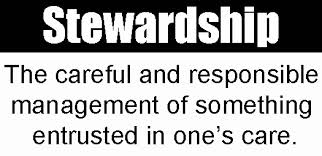I’ve been trying to reimagine stewardship lately. It’s something we all talk about, and sometimes actually even think about it. But reading everything that Paul says about stewardship in his two letters to the Corinthians and elsewhere leads me to believe that we probably have it all wrong. I know we have it wrong when it comes to fund development.
The church is an organic reality. It is not a loose knit organization of people that simply decide to get together and worship once in a while, or who have family and friends in a certain place and decide to form a church. It is a living organism called the body of Christ and it is created by Christ himself. That, all by itself should change the dynamics of what we call stewardship. How can the church be one body as Paul says it is, even though each member has a different function, if we divide that body up into various branches and units as we do in stewardship campaigns. If each individual member is important, and no function is less important than the other, how can there be “trendsetter gifts”?. How can there be “major gifts”. Are the other gifts minor? Are the other gifts followers? Why do fund developers and fund raisers spend an inordinate amount of time “cultivating” major givers?.
The answer the fundraisers will give you if you asked these questions is “this works”. Yet when Paul talks about stewardship he talks about a divine gift. He talks about equality and fairness. He brings in the uniquely Christological idea of the giving of what one has for the benefit of those who are suffering or of those that have not. Christ gave himself up for us and so we should give ourselves to our neighbors. Somewhere in his discussion he talks about how he doesn’t want to impoverish anybody so that others may be built up, he simply wants what he calls “equality”. That’s a difficult concept for us to deal with. In this life there is no such thing as equality. There may be an equality of opportunity, but there’s not any equality of results. I could give my possessions to my next-door neighbor, and he could be back in poverty again next year. I could give a portion of what I have to another neighbor and he might turn that into a million dollars by next year. I think we’re safer going down this road and say that what Paul wants is fairness.
Galatians 3 – 26 “For you are all children of God through faith in Christ Jesus. 27And all who have been united with Christ in baptism have put on Christ, like putting on new clothes. 28There is no longer Jew or Gentile, slave or free, male and female. For you are all one in Christ Jesus.29And now that you belong to Christ, you are the true children of Abraham. You are his heirs, and God’s promise to Abraham belongs to you.” This and 1 Corinthians 12 show us that there are diverse gifts but they are also divine gifts. These passages tell us that Christ places us in the fellowship, keeps us together in that fellowship, and the gifts that we receive are for the sake of Christ. We are to share not only of the faith, but our means in order to help the poor and the needy. The same apostle sees the body emerging from the gifts of God. We are participants of one another. Just as the bread and the wine are participants in the body and blood of Christ, we are participants one of another. These are gifts to the whole fellowship. We are gifts to one another.
The implications of this view of stewardship are stunning. If you and I participate with one another the way the bread participates with the body of Christ and the wine participates with the blood of Christ; if there’s no no more two but one flesh in a marriage relationship; there can’t be a whole bunch of people, there’s only one body of Christ in a given place. Therefore, I can no more be unforgiving towards you, then I can be towards myself. In the body of Christ we are one. Just as in marriage I can be no more unforgiving to my wife than she can be to me because we are one. Each one of us may set aside in our heart what we have decided to give as Paul says, but the gift still comes from the body. The gift comes from the interaction, the fellowship, the whole package that is the body of Christ, and which serves to his glory.


